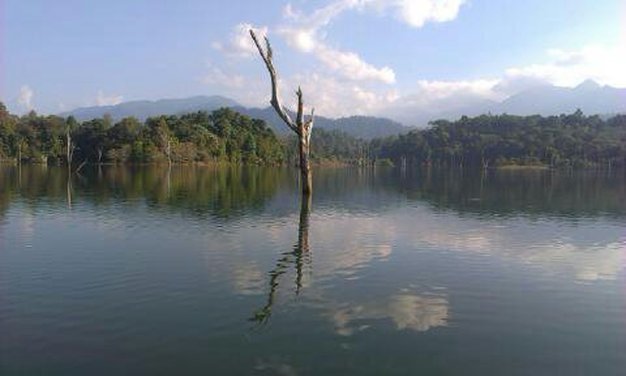 “Ecological Armageddon” – The effect of a Hydroelectric Dam on Biodiversity in Thailand. “Ecological Armageddon” – The effect of a Hydroelectric Dam on Biodiversity in Thailand. Conservation biologists, as the world sees them, are people running around the globe trying to save everything from the clutches of extinction. For some animals, their doom seems to be rapidly approaching, with vastly low numbers and impossible odds. For others, it seems the downward spiral is just beginning. But one creature, I fear may become rarer than anything else, rarer than the kakapo of New Zealand, rarer than the black- crested gibbon of SE Asia. The rare “creature” I am speaking of is optimism and it is a creature that could become even rarer. OK, so I’m probably being melodramatic. But go look around, see the latest stories from Mongabay for example. Another mine? palm oil story? An ecologically dead river? Depressing reading, right? I myself have worked in beautiful places only to see the vast amount of damage humans have done. Thailand for example, where the construction of a hydro-electric dam has caused huge declines in biodiversity. “Ecological Armageddon” was a phrase used after an assessment of the area. To hell with it, then right? After the disastrous events of early November surely it is time for conservationist to give up the ghost? How do we stay optimistic about now? So, let’s just pack in conservation and leave the world to ruin. Let the lack of action be the tinder on which the natural world burns. Absolutely not! Optimistic, yet realistic. That’s how I feel your mindset should be when working in conservation. I mentioned all the doom and gloom stories, we as conservationists acknowledge this. “conservation biology has arguably become the most depressing of the sciences” – James Sheppard in the Mongabay Article that inspired this piece. So yes, it is depressing but who doesn’t love a good underdog story? *insert inspirational Rocky quote of your choice here*, Snatching victory from the jaws of defeat? It has a nice ring to it does it not? It’s the train of thought you must have. You might be the most cynical human being on earth, but if you are working with a species on the edge of extinction, you have no option but to make yourself optimistic. You may have some nocturnal existential crises as you lay awake into the night, you may even curl up in a ball, biting a flannel as you sob in the shower. The latter is a bit extreme but it has probably happened in conservation somewhere. I have certainly doubted my work and the work of the project I have been involved in. To give you a real-world example, I recently returned from working on the Mountain Chicken Frog Project. The frog itself was decimated by the Chytrid Fungus that caused one of the fastest species declines in history with >85% population decline in less than 2 years. So, the numbers you are working with are tiny (less than 150 confirmed in the wild) so all the threats are made stronger because you can lose everything with one disastrous event, such as a tropical storm which happen frequently in the frog’s homeland of Dominica (West Indies). While working on the project I would frequently be asked; “How many frogs are left on Dominica?”, obviously a very important question. The response would often be met with “is that all?” even by non-scientists. If you told a scientist, it was often a four-letter word I probably can’t repeat here. So back to “optimistic, yet realistic”. How can I be optimistic when faced with such low numbers and almost endless threats? How could I not place a shotgun in my mouth with a toe on the trigger? Because I feel there is still hope. There were numerous positive signs while I was out there; successful breeding, potential disease resistance and healthy animals. But as I said before you have to be realistic about these things because the species is still on a razors edge, a nudge in either direction and it falls off the face of the earth forever. If these endangered species start falling into the abyss, so will conservationists. When deep in the doldrums, I wrote to David Attenborough, to ask how he stays positive. “I could not let a grandchild of mine say; grandfather you knew this was coming and you did nothing”. Obviously not true in his case, but a good lesson for us all. It does seem in today’s world that there is a never-ending torrent of stories of how it’s all for nothing. But to end on a high, do google some success stories, stories such as the US Regulations on Ivory and the plight of the Californian Condor. Truth be told, in my opinion all is not lost so I choose to be optimistic. Now, now more than ever we need to be optimistic. Comments are closed.
|
Archives
October 2017
Categories |
 RSS Feed
RSS Feed